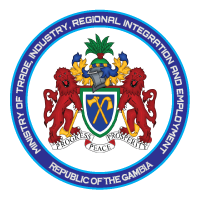The Honourable Minister of Defence, Mr. Sering Modou Njie, today delivered a statement on behalf of the Honourable Minister of Trade, Industry, Regional Integration and Employment, Mr. Baboucarr O Joof, at his office in Marina Parade, Banjul, to commemorate the 50th Anniversary of the Economic Community of West African States (ECOWAS).
In the statement marking this historic milestone, Minister Joof reflected on five decades of regional cooperation since ECOWAS was established on May 28, 1975, in Lagos, Nigeria. The Minister highlighted The Gambia’s significant achievements under ECOWAS frameworks, including democratic consolidation following the 2016 elections, economic growth exceeding 4% in 2024, and enhanced regional integration through various trade liberalization schemes.
Minister Joof began by recognizing the vision and commitment of ECOWAS founding leaders who laid the foundation for what has become “a model of regional solidarity, cooperation, and integration.” He noted that this golden jubilee provides an opportunity to assess achievements, acknowledge challenges, and reaffirm collective efforts toward building a prosperous and resilient West Africa.
The Minister recalled that ECOWAS was officially established through the signing of the Treaty of Lagos by Heads of State and Government of 15 West African countries, with the founding goal of promoting economic cooperation and integration to raise living standards across the region. The 1993 treaty revision further broadened ECOWAS’s scope to include political affairs, peace and security, and democratic governance.
Celebrating Five Decades of Progress
Over the past 50 years, Minister Joof highlighted several key areas where ECOWAS has made tremendous strides:
In political and democratic consolidation, ECOWAS has actively supported democratic transitions and election monitoring across the region. The Minister expressed deep appreciation for ECOWAS’s critical role in ensuring peaceful transition of power following The Gambia’s 2016 presidential elections, marking a historic milestone in the country’s political journey.
On economic integration and trade, The Gambia’s GDP growth exceeded 4% in 2024, driven partly by regional trade frameworks. The country remains committed to key ECOWAS integration programmes including the ECOWAS Trade Liberalization Scheme (ETLS), the ECOWAS Common External Tariff (CET), and the Interconnected Transit Guarantee System (SIGMAT), all contributing significantly to boosting intra-regional trade, industrial development, and agricultural productivity.
The West African Monetary Programme, particularly its macroeconomic convergence efforts, has helped mitigate asymmetric shocks while supporting improvements in the financial system, trade facilitation, and statistical harmonization.
Investing in Human Development
Minister Joof emphasized ECOWAS’s continued investment in human development through education. Under the ECOWAS Nnamdi Azikiwe Academic Mobility Scheme (EMAAMS) programme, over 15 Gambian students have successfully completed various Technical and Vocational Education and Training (TVET) programmes, empowering youth with skills needed for decent employment and innovation. Additionally, The Gambia has received ECOWAS Commission funding to develop a National Human Capital Development Strategy, which his ministry will soon launch in collaboration with the Ministry of Higher Education.
In health sector collaboration, through the West African Health Organization (WAHO), ECOWAS has partnered with the Ministry of Health to offer postgraduate scholarships, capacity-building, and technical assistance. The ECOWAS Commission, through the ECOWAS Gender Development Centre, has supported multiple ministries in eradicating obstetric fistula and addressing other reproductive health challenges.
The ECOWAS protocol on free movement has brought regional peoples closer together, with visa-free travel fostering integration and mobility. The Gambia has fully implemented the ECOWAS Biometric Passport and National Identification Card, facilitating smooth cross-border movement for citizens. The Ministry is also working closely with the ECOWAS Cross Border Support Programme to modernize the Wellingaraba weekly Market (Lumo) to promote regional integration.
Acknowledging Challenges and Looking Forward
Despite these achievements, Minister Joof acknowledged remaining challenges including infrastructural gaps, regulatory inconsistencies, and persistent trade barriers that hinder job creation, wealth distribution, and the shared vision for inclusive growth. Nevertheless, The Gambia remains steadfast in its commitment to overcoming these obstacles in partnership with member states and institutions.
The Minister noted that this 50th anniversary comes during a time of global challenges including geopolitical tensions, ongoing conflicts in Gaza and Ukraine, the withdrawal of Burkina Faso, Mali, and Niger, rising protectionism, and climate-related uncertainties. In this context, he emphasized that regional solidarity has never been more important, with The Gambia actively working with the ECOWAS Commission and the AfCFTA Secretariat to strengthen coordination in promoting intra-regional and continental trade.
Minister Joof encouraged all national stakeholders, especially the private sector, to take full advantage of opportunities under the ECOWAS Trade Liberalization Scheme, AfCFTA, and other regional trade instruments to scale up competitiveness and integration into regional value chains.
A Vision for the Future
While celebrating ECOWAS’s many accomplishments over 50 years, the Minister stressed the importance of not losing sight of the road ahead. He emphasized that regional integration is not an end in itself, but a means to achieve shared prosperity, peace, and sustainable development for all community citizens. Efforts must go beyond technical progress and be judged by how they transform lives through job creation, market opening, and unlocking opportunities for future generations.
The Government of The Gambia, through President Adama Barrow’s leadership, remains fully committed to the ECOWAS Vision 2050, with the Ministry continuing to provide strong direction in fostering regional integration through policy coordination, stakeholder engagement, dialogue, and capacity building.
Conclusion
Minister Joof concluded by extending sincere appreciation to the ECOWAS Commission, ECOWAS Parliamentarians, and all national stakeholders who have contributed to The Gambia’s progress on the path of regional integration. He called for continued collaboration across borders, institutions, and communities to build a more united, prosperous, and peaceful West Africa.

